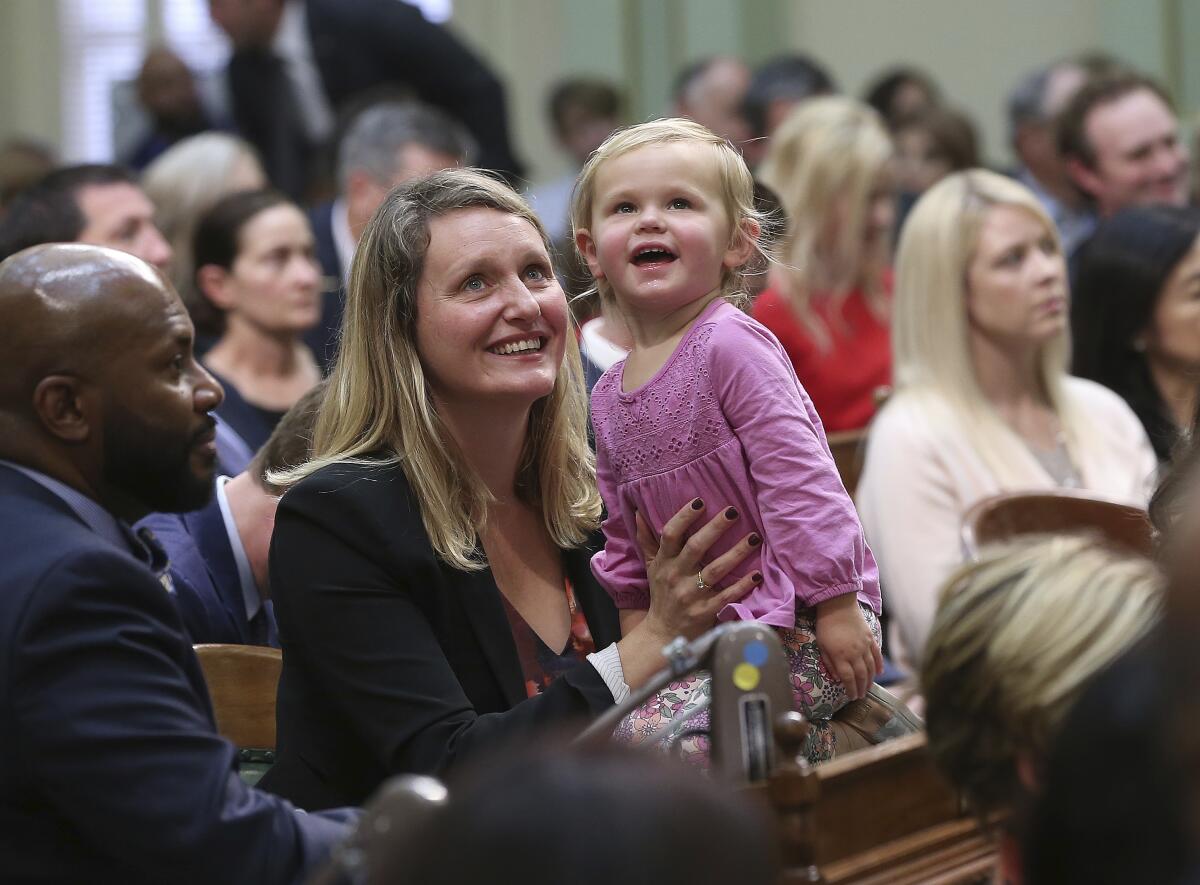Despite pandemic woes, California bill to accommodate working parents fails

- Share via
SACRAMENTO — As Assemblymember Buffy Wicks (D-Oakland) struggled with COVID-19 last week and cared for her two young children, she lamented the failure of her effort to require employers to provide greater accommodations for working parents.
She had pulled JoJo, 5, and Ellie, 22 months, out of summer camp and nanny care because of the virus, and she too had just tested positive.
Wicks noted she comes from a “big place of privilege” as a state lawmaker, able to stay home that day. But “it’s different when you’re working three jobs in the service sector,” she said.
“Before I had kids I had no idea how hard it is to juggle it all at once,” she said from her home in Oakland. “You need flexibility.”
Wicks authored Assembly Bill 2182, legislation that would have expanded job protections to employees tending to “family responsibilities” and banned employers from firing workers because of abrupt parenting needs.
The bill would have created antidiscrimination provisions for caregivers and required bosses to accommodate workers when it comes to unforeseen circumstances such as school and day-care closures so long as it did not create “an undue burden” on the workplace.
But the bill, supported by a coalition of labor and social justice organizations, failed to make it past the Assembly Appropriations Committee, a key gatekeeper panel that decides whether legislation with a price tag will advance.
The California Chamber of Commerce labeled the bill a “job killer” and alleged it could lead to uncapped time off and expose employers to litigation.
Dozens of employer organizations opposed the bill, warning that “family responsibilities” was too broad a protected classification and would allow employees to challenge “any adverse employment action” in the name of parenthood.
“In reality, an employee is likely to call in that morning saying they cannot show up for work, and the business will be forced to accommodate or face litigation,” Ashley Hoffman, a policy advocate for the California Chamber of Commerce, said in a legislative hearing, urging lawmakers to vote against the bill. “By enacting this bill we are putting another vague mandate on small businesses.”
A similar bill by Wicks also failed in the Legislature last year, but she says she plans to keep trying. Other states, including Connecticut, Delaware and Maine, have passed similar laws.
Wicks became a symbol of working mothers in 2020 when she brought her newborn to the state Assembly floor after her request was denied to vote remotely during maternity leave amid the pandemic.
Hundreds of parents across the country reached out to Wicks saying the moment resonated with them as they struggled to balance work and home life amid mass school closures.
“My hope at the time was there would be a great awakening for the need for caregivers to have more flexibility. I thought that we would have a different understanding now of parental responsibilities, given what we have just gone through,” Wicks said.
It’s also a women’s rights issue, Wicks said. The U.S. Bureau of Labor Statistics reported that 80% of the 1 million-plus workers who left the workforce in 2020 amid school and day-care disruptions were women, who disproportionately bear caregiving duties.
As California steps up as a bastion for women’s rights amid attacks on abortion access, it’s important for state leaders to acknowledge that more progress can be made even here, said Assemblymember Cristina Garcia (D-Bell Gardens), chair of the state Legislative Women’s Caucus.
While bills prioritized by the caucus regarding reproductive rights have made it through the Legislature, Garcia pointed to other gender-equity bills focused on issues such as wage disparities that have failed this year.
“We’ve had progress and I want to acknowledge that, but that doesn’t deny the fact that we still have many more steps to go,” Garcia said. “As progressive as we are, we have a lot more to do.”
More to Read
Get the L.A. Times Politics newsletter
Deeply reported insights into legislation, politics and policy from Sacramento, Washington and beyond. In your inbox twice per week.
You may occasionally receive promotional content from the Los Angeles Times.











